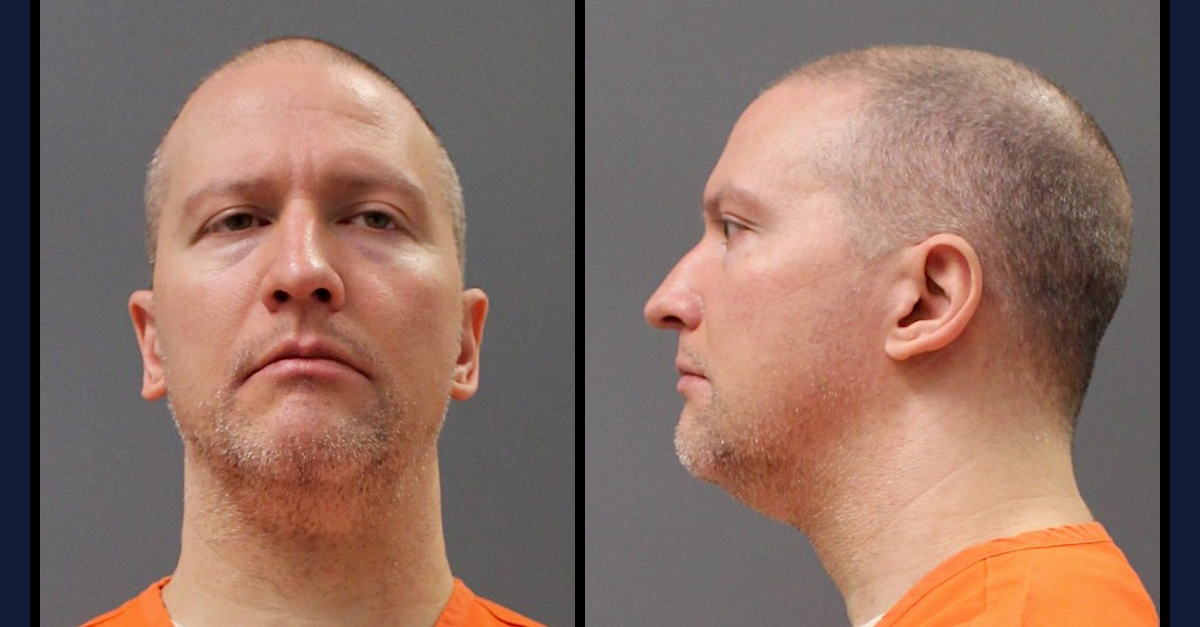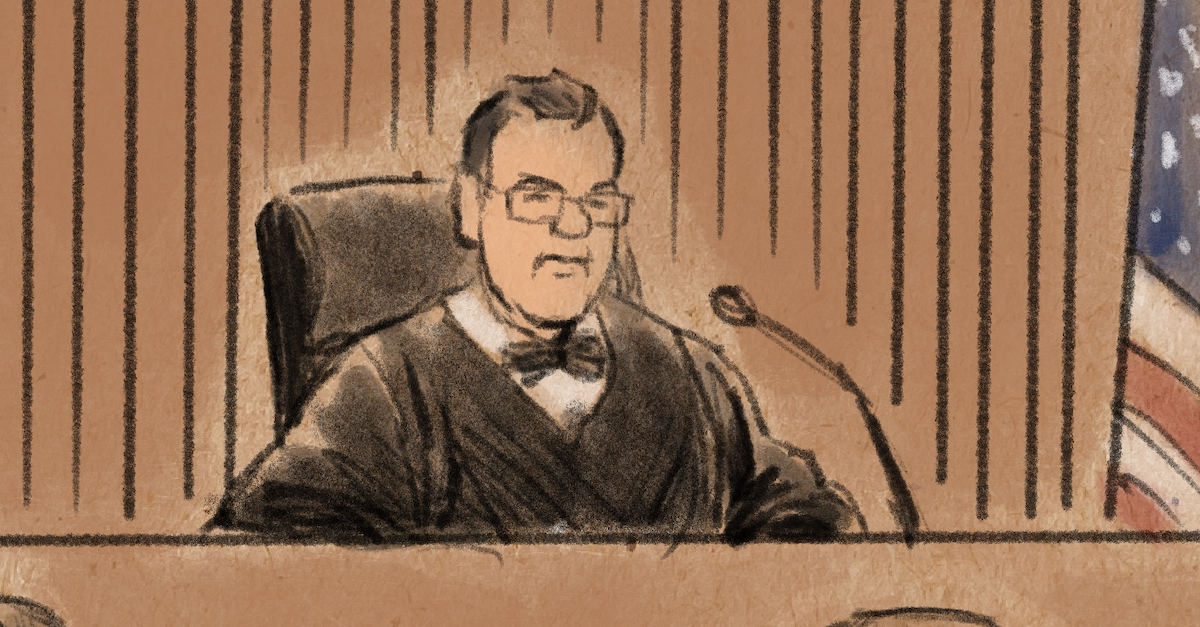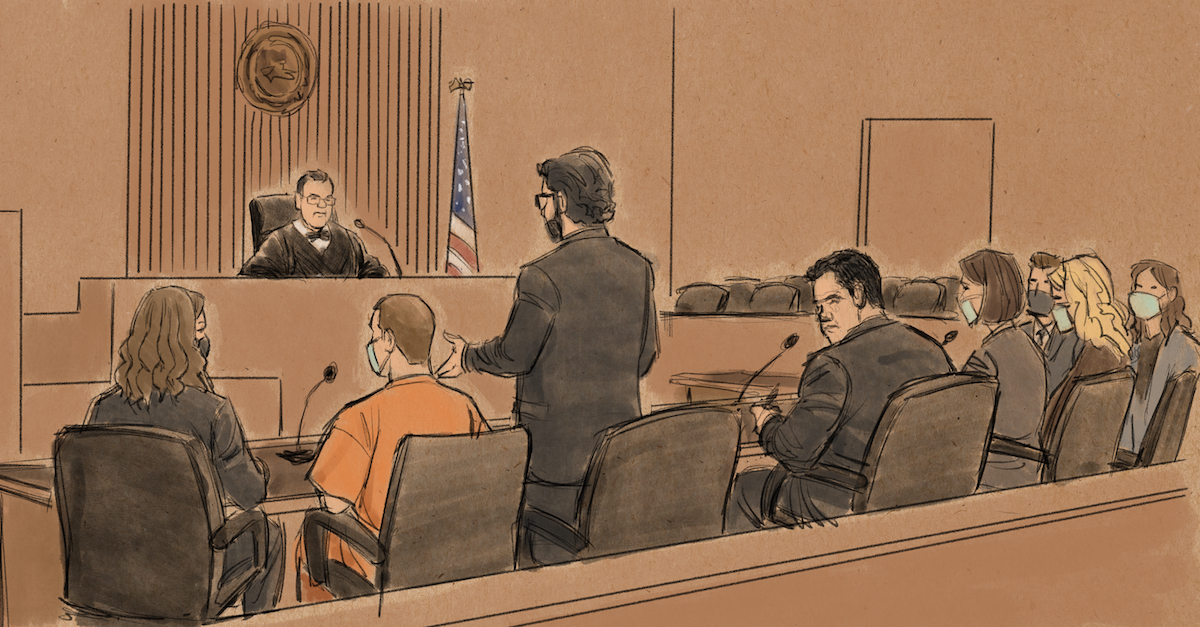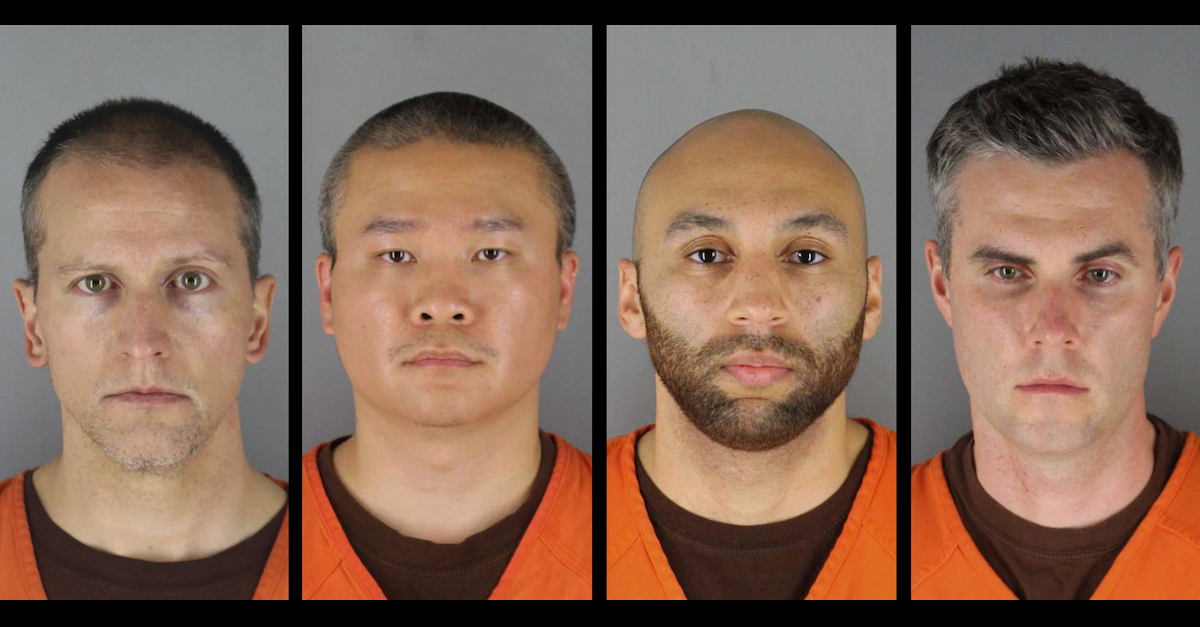
Convicted ex-Minneapolis police officer Derek Chauvin appears in mugshots released by the Minnesota Department of Corrections.
A federal judge on Wednesday accepted a guilty plea and a concomitant plea agreement and sentencing stipulation from Derek Chauvin, the former Minneapolis police officer already convicted in state court proceedings for murdering George Floyd, Jr.
Chauvin was accused by federal prosecutors of violating Floyd’s civil rights during a now-infamous and fatal May 25, 2020 encounter; he was also accused federally of violating the civil rights of an unnamed Black juvenile in 2017. Chauvin pleaded guilty via an agreement filed Dec. 15, 2021, to two counts of depravation of rights under color of law — one count for each victim.
The latter case involving the juvenile was previously charged separately from the matter involving Floyd, but prosecutors effectively merged the cases just moments before a plea hearing last December. In that hearing, prosecutors and Chauvin’s attorneys submitted a plea agreement, and Chauvin voiced a desire to plead guilty according to the terms of the deal his attorneys hammered out with the feds — but the plea and the agreement were not official until they were accepted by a judge. The acceptance formally occurred on Wednesday, May 4, 2022 via a one-page document signed by U.S. District Court Judge Paul A. Magnuson in the District of Minnesota. Part of the delay was due to Judge Magnuson’s desire to see the results of a presentence investigation before he accepted the agreement. The presentence investigation itself is sealed.
Judge Magnuson’s order said he would sentence Chauvin in accordance with the terms of the agreement — a nod to the rare posture of the plea agreement itself.

A courtroom sketch shows Judge Paul Magnuson during Derek Chauvin’s change-of-plea hearing on Dec. 15, 2021. (Art by Cedric Hohnstadt.)
The judge’s Wednesday order noted that the plea agreement was filed under Rule 11(c)(1)(C) of the Federal Rules of Criminal Procedure — a rule that is infrequently used in federal courts. When they are employed, so-called “C” pleas generally do not allow judges any sentencing discretion — in Chauvin’s case, the agreement provides very little discretion — and federal judges are accordingly known to dislike them on account of their restrictive nature with regards to the role of the court. One law review article called “C” pleas “sentence bargain agreements.”
Prosecutors are much more apt to suggest possible sentencing factors under a different rule — Rule 11(c)(1)(B) — and to leave judges with comparatively broader discretion to ascertain a penalty in accordance with federal statutes and sentencing guidelines. Under these more traditional “B” pleas, a defendant cannot withdraw a plea if he does not like a resulting sentence. Under “C” pleas, if the court rubbishes the agreement, the defendant can withdraw the plea and instead face trial.
Therefore, “C” pleas are lockstep agreements between defendants and prosecutors. The only role a judge can play is to accept the agreement — and the sentence — or to reject it in whole. They also allow defendants a significant ability to negotiate their own sentences in return for their pleas.
Some judges have rejected “C” pleas for this very reason (namely, because they explicitly limit sentencing options for the court). For instance, a federal judge in Houston famously rejected such a plea for Lea Fastow, the wife of former Enron Chief Financial Officer Andrew S. Fastow.
“The court declines to voluntarily limit its role in sentencing,” now-Senior U.S. District Judge David Hittner reportedly said in the case against Mrs. Fastow. Rather than accept the locked-in sentence, Judge Hittner tossed the entire agreement and ordered a trial.
In Chauvin’s federal case, Judge Magnuson accepted Chauvin’s negotiated “C” plea — in what is almost certainly a major victory for his defense.

A courtroom sketch shows Derek Chauvin, seated in orange prison garb, agreeing to plead guilty to federal civil rights crimes before Senior U.S. District Judge Paul Magnuson on Dec. 15, 2021. (Art by Cedric Hohnstadt.)
After his televised state-level trial, Chauvin was sentenced on June 25, 2021 to 22.5 years in a Minnesota facility for murdering Floyd. The federal sentence agreed to in principle on Dec. 15, 2021, technically added two and a half years to the former police officer’s maximum possible term of state incarceration — but there are many important caveats.
Chauvin’s federal plea agreement document said prosecutors would ask for “a sentence of imprisonment of no less than 240 months [20 years] and no greater than 300 months [25 years]” — the short range to which the judge is now bound. Per the document’s own terms, Chauvin will be “expected to serve no less than 204 months and no greater than 255 months” behind bars in an actual prison facility, assuming credit for his anticipated good behavior. The caveats therefore indicated that Chauvin’s term of incarceration will involve a time frame of somewhere between 17 years and 21 and one-quarter years behind bars. Any sentence beyond that prison term may be served via some other mechanism, such as (perhaps) home detention.
During the December plea hearing, Judge Magnuson reminded Chauvin that he could have faced a life sentence had he taken the federal case to trial and subsequently been convicted. The judge drifted a bit from the actual plea agreement and noted that in federal court, defendants generally serve 90% of their sentences behind bars; he suggested the total period of incarceration might last between 18 and 22 and one-half years (depending on the final sentence). In state court, the judge noted, defendants generally serve approximately two-thirds of their sentences behind bars.
Therefore, though Chauvin’s federal sentencing range and his state-ordered sentence are roughly congruent, the federal penalty is poised to add at least some prison time onto his state-ordered period of confinement.
A federal jury convicted Thomas Lane, J. Alexander Kueng, and Tou Thao of the same charge to which Chauvin pleaded guilty. Those three officers were charged with acting in concert with Chauvin to deprive George Floyd of his federal civil rights. All three are asking for a new trial due to what they believe was misconduct by prosecutors. The trio has not been sentenced on federal charges, and NBC News reported that the three remaining officers refused a state plea agreement on separate criminal charges at that level because it was unclear precisely how they would be sentenced in federal court.

Derek Chauvin, Tou Thao, J Alexander Kueng, and Thomas Kiernan Lane appeared in an array of mugshots taken around the time all four were charged in connection with George Floyd’s death.
The case involving the Black juvenile alleged that Chauvin deprived the rights of the teen “without legal justification” by ” holding him “by the throat” and striking him “multiple times in the head with a flashlight.” A felony information says Chauvin’s actions “included the use of a dangerous weapon — a flashlight — and resulted in bodily injury.”
According to prison records, Chauvin is currently incarcerated in Minnesota’s Oak Park Heights Correctional Facility in Stillwater. That facility is about half an hour due east of downtown Minneapolis near the Wisconsin border. His term of incarceration, per those records, is due to expire on June 8, 2043, but his anticipated release date is listed as Dec. 10, 2035 — about 14 and a half years after he was sentenced to 22.5 years.
Chauvin is appealing his state conviction. A formal sentencing hearing for Chauvin’s federal case has not yet been scheduled on the concomitant court docket.
Chauvin’s Dec. 15, 2021 plea agreement and sentencing stipulation — it’s technically a single document — is below. Also below is the judge’s order accepting the terms of that agreement.
[Featured image via the Minnesota Department of Corrections; other images as noted.]